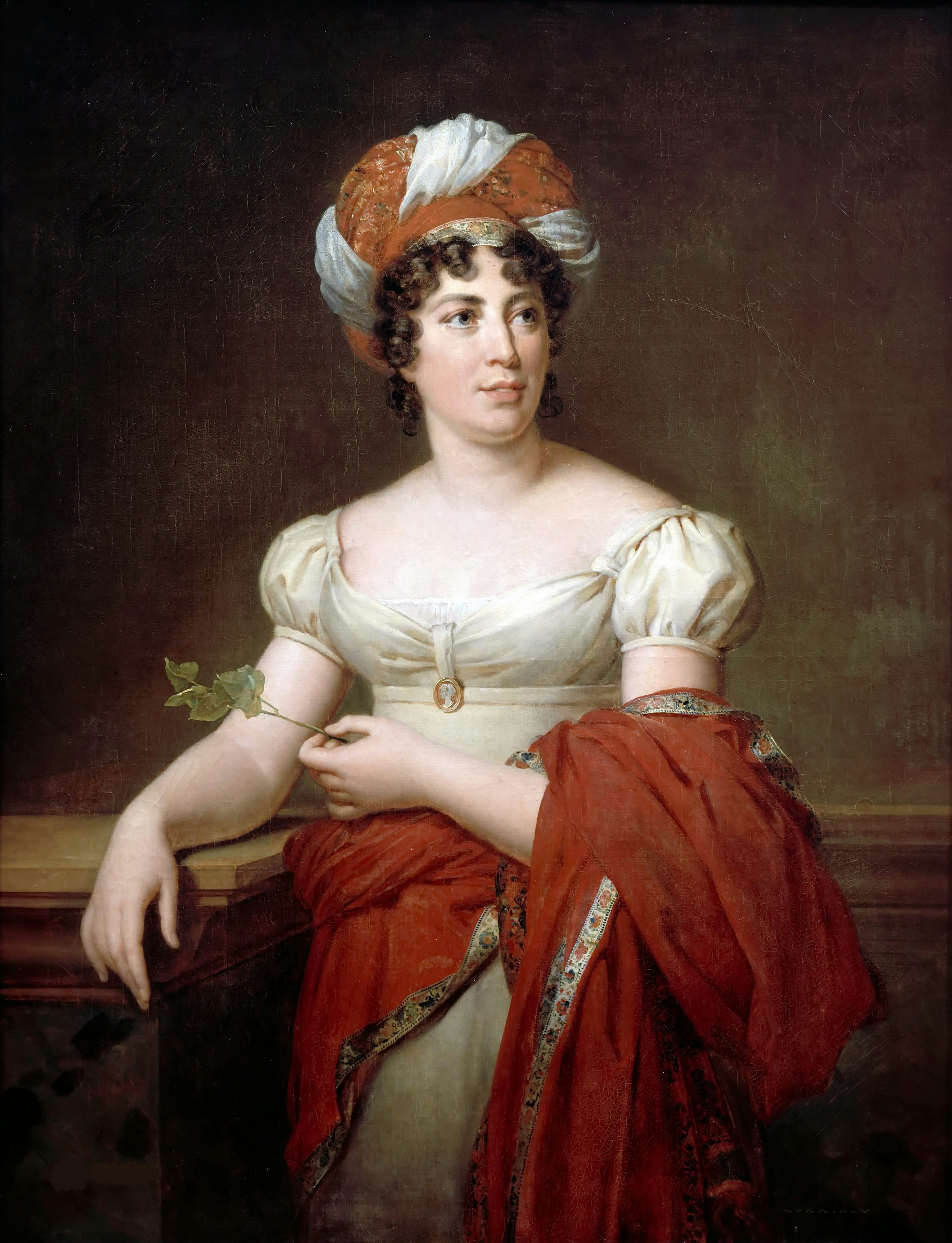Frases célebres de Germaine de Staël
Fuente: [Señor] (1997), p. 48.
Fuente: De l'influence des passions, etc., 1820.
Frases de fe de Germaine de Staël
Reflexiones
Fuente: Politics, Literature and national Character, Nueva York, 1964. [ref. incompleta]
Reflexiones
Fuente: Acerca de la literatura, 1800. [ref. incompleta]
Reflexiones
Fuente: Alemania, 1810. [ref. incompleta]
“¿Qués es, pues, la felicidad sino el desarrollo de nuestras facultades?”
Fuente: [Ortega Blake] (2013), p. 1672.
Fuente: Corinne (XIV, cap. 1).
Fuente: [Goicoechea] (1952), p. 29.
Germaine de Staël Frases y Citas
Fuente: Corinne (VII, cap. 2).
Fuente: [Goicoechea] (1952), p. 29.
“La negligencia de los deberes menudos sirve de aprendizaje para las faltas grandes.”
Fuente: [Ortega Blake] (2013), p. 2861.
“Ser totalmente comprensiva la hace a una indulgente.”
Fuente: [Ortega Blake] (2013), p. 2256.
Fuente: Corinne (Libro XVIII, cap. 5).
Fuente: [Goicoechea] (1952), p. 388.
“Viajar es uno de los placeres más tristes de la vida.”
Fuente: Corinne (Libro I, cap. 1).
Fuente: [Goicoechea] (1952), p. 487.
“Saber y sentir, he aquí toda la educación.”
Fuente: [Ortega Blake] (2013), p. 1405.
“Matrimonio, es decir, la asociación de todos los sentimientos y todos los pensamientos.”
Fuente: Corinne (VI, cap. 2).
Fuente: [Goicoechea] (1952), p. 294.
“Los placeres del pensamiento son un eficaz remedio para las heridas del corazón.”
Fuente: [Ortega Blake] (2013), p. 3131.
“Los hombres se empeñan en creer que lo que es seguirá siendo.”
Fuente: [Ortega Blake] (2013), p. 3784.
“La murmuración se parece al humo porque se disipa pronto, pero ennegrece todo lo que toca.”
Fuente: [Señor] (1997), p. 111.
“La inteligencia humana hace continuos progreso, pero estos progresos son en espiral.”
Fuente: [Goicoechea] (1952), p. 253.
“La filosofía debe descansar sobre dos bases: la moral y el cálculo.”
Fuente: [Ortega Blake] (2013), p. 1816.
“Es fácil ser mujer cuando se es insensible.”
Fuente: [Ortega Blake] (2013), p. 2777.
“El talento no impide tener manías, pero las hace más notables.”
Fuente: [Señor] (1997), p. 502.
Fuente: [Ortega Blake] (2013), p. 2560.
Fuente: Germanie (p. 3ª, cap. VIII).
Fuente: [Goicoechea] (1952), p. 247.
“El hombre celoso no es el amante que ama; es el propietario que se enfada.”
Fuente: [Ortega Blake] (2013), p. 721.
Germaine de Staël: Frases en inglés
Bk. 13, ch. 4, as translated by Letitia Elizabeth Landon for Isabel Hill (1833)
Corinne (1807)
“All that is natural is varied.”
Tout ce qui est naturel est varié.
Bk. 1, ch. 4
Corinne (1807)
“Ought not every woman, like every man, to follow the bent of her own talents?”
Bk. 14, ch. 1
Corinne (1807)
La vue d'un tel monument est comme une musique continuelle et fixée, qui vous attend pour vous faire du bien quand vous vous en approchez.
Bk. 4, ch. 3
The idea that "architecture is frozen music" — an aphorism of disputed origin sometimes misattributed to de Staël — is found in a number of German writers of the period.
Corinne (1807)
“We cease loving ourselves if no one loves us.”
On cesse de s'aimer si quelqu'un ne nous aime.
Sophie, or The Secret Sentiments (Sophie, ou les sentiments secrets, 1790), Act 2, sc. 8
“The human mind always makes progress, but it is a progress in spirals.”
Probably a paraphrase of this line from De l’Allemagne, Pt. 3. ch. 10. "Goethe has made a remark upon the perfectability of the human mind, which is full of sagacity: It is always advancing, but in a spiral line." Not known from Goethe's works.
Misattributed
“The desire of the man is for the woman, but the desire of the woman is for the desire of the man.”
Sometimes published as an anonymous saying, this was attributed to Bishop Samuel Wilberforce in Is It Nothing To You? Social Purity, A Grave Moral Question (1884) by Henry Rowley, p. 88; to Samuel Taylor Coleridge in "Would You Be Re-elected", Munsey's Magazine (April 1909), p. 769; and to de Staël in Aspects of Western Civilization : Problems and Sources in History (2003), p. 294
Disputed
L'esprit consiste à connaître la ressemblance des choses diverses et la différence des choses semblables.
Pt. 3, ch. 8
De l’Allemagne [Germany] (1813)
“Danger is like wine, it goes to your head.”
Bk. 12, ch. 2
Corinne (1807)
“The admiration of the beautiful always has relation to the Divinity.”
Pt. 4, ch. 1
De l’Allemagne [Germany] (1813)
Original: (fr) L'admiration pour le beau se rapporte toujours à la Divinité.
“Religion is nothing, if it is not everything; if existence is not filled with it.”
Pt. 4, ch. 1
De l’Allemagne [Germany] (1813)
Original: (fr) La religion n'est rien si elle n'est pas tout, si l'existence n'en est pas remplie.
The Influence of Literature upon Society (De la littérature considérée dans ses rapports avec les institutions sociales, 1800), Pt. 2, ch. 4
